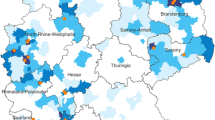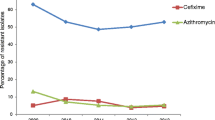Abstract.
The annual incidence of gonorrhea in Israel has sharply increased during the past 2 years. At the end of 1999, high-level ciprofloxacin-resistant strains of Neisseria gonorrhoeae (MIC90, ≥32 mcg/ml) also exhibiting decreased susceptibility to penicillin and tetracycline were isolated for the first time in southern Israel, as well as in other regions of the country. The incidence of male gonococcal urethritis in the south increased in a 1.5-year period from 3/100,000 to 12/100,000 (P<0.05) in correlation with increased isolation of ciprofloxacin-resistant organisms. A marked increase in the incidence of gonorrhea was also encountered in Jerusalem, where ciprofloxacin resistance affected 54.5% of the isolates in 2000. Pulsed-field gel electrophoresis typing of gonococci from different areas of Israel indicated that all of the ciprofloxacin-resistant isolates belonged to identical or related strains. Since fluoroquinolone-resistant gonococci may emerge and disseminate extensively over a short period of time, continuous surveillance of antibiotic susceptibility among gonococcal isolates should be performed to guide empiric therapy.
Similar content being viewed by others
Author information
Authors and Affiliations
Additional information
Electronic Publication
Rights and permissions
About this article
Cite this article
Yagupsky, .P., Schahar, .A., Peled, .N. et al. Increasing Incidence of Gonorrhea in Israel Associated with Countrywide Dissemination of a Ciprofloxacin-Resistant Strain. Eur J Clin Microbiol Infect Dis 21, 368–372 (2002). https://doi.org/10.1007/s10096-002-0717-1
Issue Date:
DOI: https://doi.org/10.1007/s10096-002-0717-1




